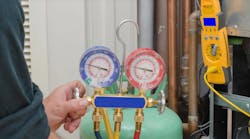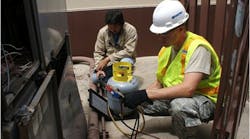If you're a technician or construction worker who deals with the installation, maintenance and repair of heating, ventilation and air conditioning (HVAC) systems, then you might already know that the U.S Environmental Protection Agency (EPA) requires all such technicians to acquire certification or a license in order to operate legally.
However, in order to obtain a license, every worker must first get a HVAC Contractor license bond. If you are new to the industry, or still an apprentice, surety bonds might still be a tricky topic to understand. So in case you’re still wondering what these bonds are, why they’re important and how to get them, here’s everything you need to know.
What Is a HVAC Contractor License Bond?
Obtaining a HVAC Contractor License Bond is the last step you need to perform before getting your operating license. The bond is an important document, because it's a type of insurance for your customers, guaranteeing that you'll operate in an ethical manner, and in compliance with state rules and regulations.
If, by any chance, you're unable to meet the deliverables of your contract, then the client has the right to file a claim against you. This is where your HVAC contractor license bond comes into play. The surety bond company which has bonded you will, at first, cover your client’s losses. Later on, you'll need to repay your bonding company back.
In short, the HVAC contractor license bond represents your responsibility towards the client. It guarantees that entering into business with you will not result in any monetary losses for them.
Why Do I Need an HVAC Contractor License Bond?
You need a HVAC Contractor License Bond, first and foremost, because you can't obtain an operating license without it. Practicing without a valid license is illegal.
Different states have different licensing requirements for HVAC technicians who want to get certified. For example, in order to get licensed in the State of Texas, the Texas Department of Licensing and Regulation requires, among other things, 48 months of practical experience in air conditioning and refrigeration related work under the supervision of a licensed air conditioning and refrigeration contractor in the preceding 72 months before applying. In Maryland, one must have been licensed as an apprentice for at least three years, and during that period must have completed at least 1,875 hours of training in providing heating, ventilation, air conditioning, and refrigeration (HVACR) services under the direction and control of a licensed HVACR contractor.
The requirements for getting a license as a HVAC contractor clearly vary from state to state. The only thing most of them have in common is the surety bond requirement. If there's a requirement for a license, you'll probably need to obtain a HVAC Contractor License Bond as well.
The States of Vermont, Wisconsin, Wyoming, Montana, Ohio, New York, New Hampshire, South Dakota and Pennsylvania don't require licensing to work as a HVAC technician. Although, certain counties and municipalities within the state might, so it is advisable for you to check with your local council before starting work.
How Much Does an HVAC Contractor License Bond Cost?
Getting bonded can be done online, and with the right surety bond agency, it can be a very fast and straightforward process.
After you've chosen the agency you want to work with, you'll be asked to provide them with information about your business and your personal credit score. You will almost instantly be given a quote on the price you have to pay for your bond.
You don't need to pay the entire bond requirement, but just a percentage of it; this is called the premium. That percentage is based mainly on your credit score. The better your credit score is, the smaller the premium you have to pay.
If you have a brilliant credit score, most companies will ask you to pay between 1% and 3%. If you have bad credit, there are some surety bond agencies, such as JW Surety Bonds or Bryant Surety Bonds, which can still get you bonded, but you will need to pay a higher premium. This is usually anywhere between 3% and 15%.
The HVAC Contractor License Bond requirement varies from state to state:
- Alabama—$15,000 surety bond requirement
- Alaska—$5,000 surety bond requirement
- Arizona—the surety bond requirement is based on your projected annual revenue.
- Arkansas—$10,000 surety bond requirement.
- California—$5, 000 surety bond requirement
- Delaware—the bond needs to be equal to six percent or more of jobs worth 20,000 or more.
- District of Columbia—$5,000 surety bond requirement.
- Florida—$20,000 for Division I contractors and $10,000 for Division II contractors.
- Georgia—$10, 000 surety bond requirement.
- Hawaii—$5, 000 surety bond requirement.
- Indiana—$5, 000 surety bond requirement.
- Louisiana—$5,000 surety bond requirement.
- Maryland—$20,000 surety bond requirement.
- Massachusetts—$5,000 surety bond requirement.
- Minnesota—$5,000 surety bond requirement.
- Mississippi—$5,000 surety bond requirement.
- Nebraska—$5,000 surety bond requirement.
- Nevada—bond depends on job size.
- New Mexico–$10,000 surety bond requirement.
- North Dakota–$1,000-$2,000 surety bond requirement.
- Oregon—$15,000 commercial surety bond requirement.
- Oklahoma—$5,000 surety bond requirement.
- Oregon—$15,000 surety bond requirement.
- South Carolina—depends on your financial statements.
- Washington—You need to post a $12,000 bond if you register as a general contractor and a $6,000 bond if you register as a specialty contractor.
- West Virginia—HVAC contractors need to post a wage bond.
Once you've gotten your HVAC Contractor License bond, you or your surety bond agency need to send a copy of it, along with the rest of the required documents, to the state authority which will be processing your license.
The Bottom Line
In short, the HVAC Contractor License Bond is one of the most important documents you need to obtain in order to get an operating license. If you are required by your state to get licensed, you are probably obligated to get bonded, as well.
The price of the surety bond amount varies from state to state and you only need to pay a percentage of the requirement, depending on your business and credit score. You can get a quote on your premium almost instantly from your surety bond agency.
Visit the JW Surety Bonds website for additional information.
Boryana Gramatikova is a recent University of Westminster graduate with an MA in Broadcast Journalism. Her interest span across film, sports and Asian culture. She has vast experience in blogging on everything surety bond-related. Currently she contributes to the JW Surety Bonds blog.









